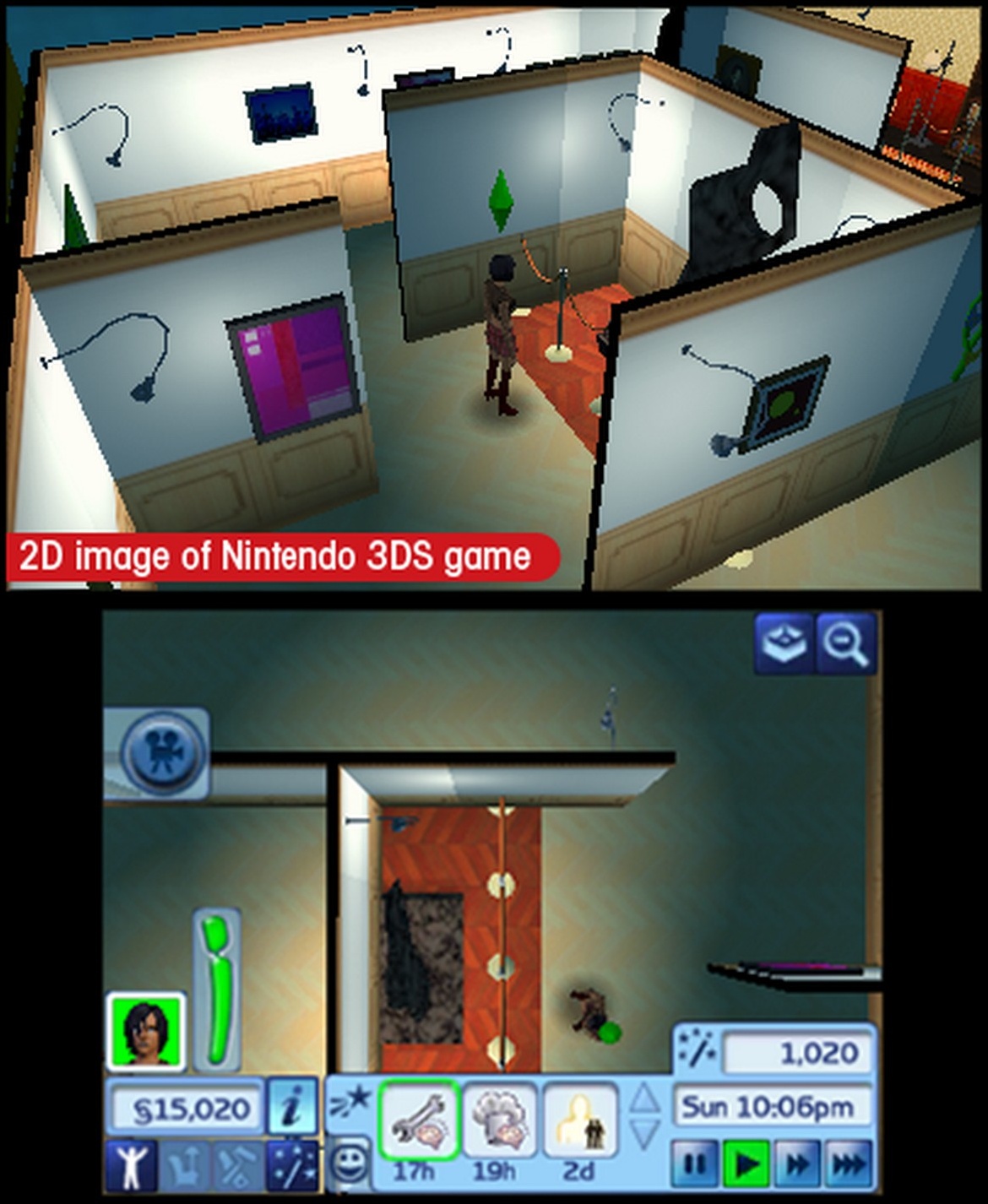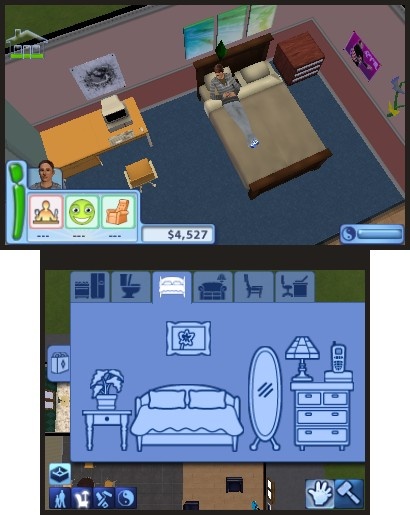When adapting a big game to a handheld system, how much can be stripped away before the game loses its identity? The Sims 3 on the 3DS tries valiantly to retain the series' absorbing life management, serving up some of the easygoing dollhouse joy that Sims addicts have come to crave. Yet while the superficial fun is retained, the loss of certain features and the restructuring of others make The Sims 3 more predictable and hollow than it might have been. It's still entertaining to watch your sim interact with others, gesticulating wildly while telling a joke. But the delicate balance of mundane activities versus social ones has been upset, so you spend more time repairing television sets and less time going out for a night on the town. Both Sims fans and newcomers will initially take to this portable people farm. All too soon, however, the fun transforms into something far more insidious: tedium.
The basics remain the same from the PC and console versions of The Sims 3. You create a little digital person called a sim and customize his or her features, clothing, and traits. You also select a lifetime wish to work toward, such as becoming a rock star or leader of the free world. Sim creation has been pared down, but there are enough choices for you to make a somewhat authentic-looking version of yourself, your best friend, Oprah Winfrey, or an individual born of your imagination. The jaunty music pulled from the other versions of the game sets the stage for the cuteness to come, and its pizzicato strings and catchy melodies continue through the game. The soundtrack is a delightful comfort, brightening up the day as you guide your tiny person through everyday life. This means getting him to work on time, emptying his bladder when he needs to go, and watching TV or playing on the computer to unwind. Sleeping, reading, and shopping are all tasks you assign to your sim, and as long as he's not too unhappy, he'll perform these tasks as you queue them up.
There is some fun to be had here, as franchise fans would rightfully expect. Unplanned events are possibly the most enjoyable ones. For instance, your wannabe chef might start a fire while cooking up some mac and cheese. The stove erupts in flames, your sim goes into hysterics, and you can either try to get your sim to handle it himself or have him call the fire department. (Or, if you have a fire alarm installed, firefighters will come automatically.) If you'd rather keep things less dramatic, you can play your guitar for tips, which not only earns you simoleans, but also improves your guitar skill. And if you don't want to play Mr. Nice Guy, why not pick a fight with another sim? The resulting cartoonish scuffle is a hoot to watch and makes it tempting to make more enemies than friends.
The superficial joys provide a few hours of entertainment, but they are sadly undercut by the frustrations that soon set in--most of them a result of how the game has stripped away elements of its big brother on the PC. For example, appliances break far too often, so your shower or sink will spew water everywhere, forcing you to repair it and mop up the spills. Yet unlike in other versions of the game, you can't hire a maid and call a repairman. Thus, you waste time dealing with puddles when you'd rather head to the bookstore. (There are two different town hubs to visit in addition to your own lot.) The game may indicate that your handy sim wants to improve his repair skill within a certain time period, but you have to wait for something to break because you can't tinker with electronics as you might in other versions.

Other annoyances come as a result of the removal of the meters that indicate your standard needs, such as hunger, fun, bladder, and so forth. The game informs you when such needs are getting crucial, but these indications often come at inconvenient times and are no substitute for having the information available at will. Your sim might get hungry when he's in bed, for example, so you might have to sacrifice sleep for food, when it would have been even better to avoid the choice entirely. This tweak, along with many others, undermines the freedom that has made the series so popular by forcing you to perform very specific actions rather than allowing you to play as you wish.
Digging further reveals other flaws. Socializing has always been an important aspect of the Sims experience, and visitors are constantly ringing your bell or luring you into conversation. Hearing your digital acquaintances chat in the series' signature Simlish language will tickle your fancy, though conversation options aren't as rich as you might like. Nonetheless, the exaggerated animations instill social interactions with classic Sims charm. Yet, you might spend countless in-game days chatting it up with your neighbors, only to discover that your relationship meters have barely moved. It's unclear if the meters' reluctance to move is a design choice or a bug, though there are certainly some obvious bugs to be found. (For example, you may not be able to repair a radio, even though you should be.) In any case, you need to put a lot of time and effort into relationships to reap the rewards. It's unfortunate that while you can develop a romance and ultimately enjoy multi-sim households, you cannot have children. There are no youngsters in The Sims 3, nor is there aging. Thus, other wonderful elements of the series, such as genetics, have also been excised.
The building and buying aspects have fortunately not been removed, though they were streamlined in sensible ways. You can't get too carried away with decking out your lot; there is no terraforming, for example. But there are still lots of goodies to buy for your place (sofas, ovens, showers, and so on), as well as ways to customize and add to your abode (wallpaper, carpet, flower beds, and what have you). The interface works well enough in all modes of play. You order your sim and place objects using the touch screen; the top screen stays focused on your sim while in live mode, and it allows you to scroll around in other modes. The touch screen is cluttered, so you may not always select the object or sim you want to interact with on the first tap. The top-down view can also make certain activities, like applying your new paint scheme, a bit of a chore. But overall, Sims enthusiasts and newcomers alike will take to the interface relatively quickly.

The 3D aspect of The Sims 3 doesn't benefit the game nor does it detract from it. Aside from a few tiny touches, such as the way litter blows around when you use karma points to activate a windstorm, the visual design doesn't take advantage of this aspect of the 3DS. The game suffers from some slowdown, but overall, it retains the series' unique visual identity. It's a shame that other aspects of the series' identity have been lost in translation. Though pursuing your sim's dreams and interacting with neighbors provides some entertainment, the predominance of tedious chores and the restriction of choices make this virtual life much less exciting to live.